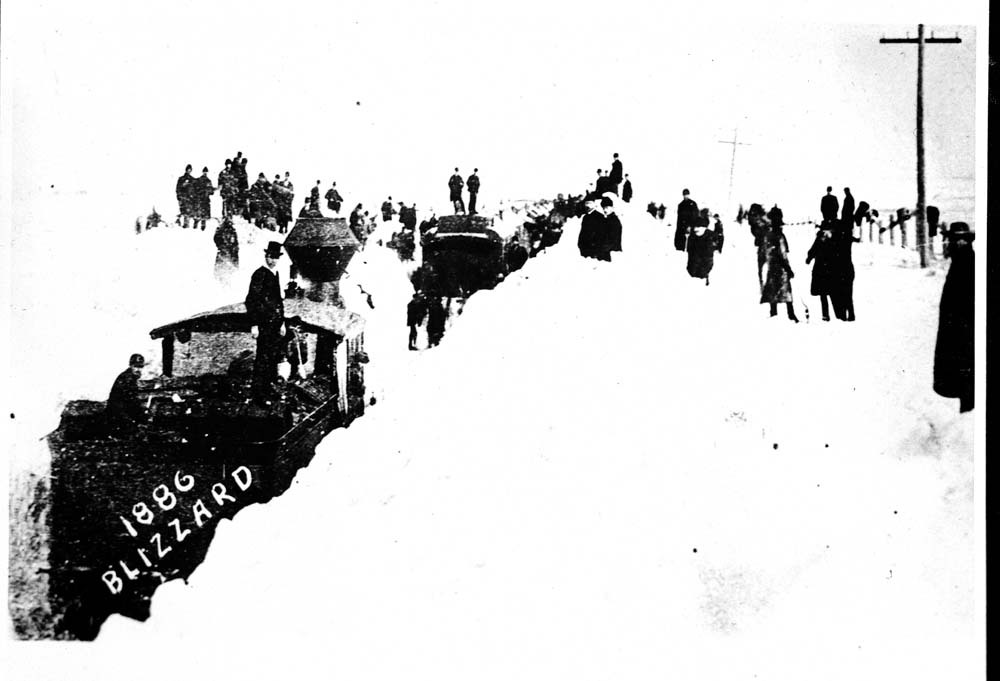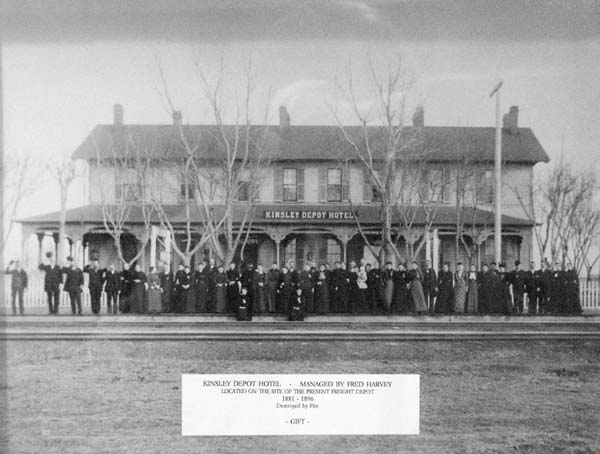Last week, I wrote about the Kinsley gentlemen calling on ladies on New Year’s Day, January 1, 1886. That was 135 years ago when New Year’s Day also fell on Friday, as it did this year.
The day started out very mild, but while the men were calling, it began to snow. It turned into a blizzard that night which continued until Monday morning. At least 8 inches of snow fell and drifted with 20-30 mph winds and 12° F temperatures.
Two days later, on Wednesday, January 6, a second, more severe blizzard hit. The Kinsley Mercury reported: “The “blizzard” which struck this place at about nine o’clock Wednesday night was one of the worst that ever visited this country. The oldest inhabitant of them all acknowledges that he never saw anything worse. The wind blew a gale from the north, while the thermometer soon sank several degrees below zero, and the snow, which was all the time falling fast, was blown across the face of the earth in clouds so dense that at times the eye could not penetrate it for a distance of more than one or two rods. The storm continued all day Thursday, the mercury still falling, until at four o’clock p.m. the thermometer registered eight below. About six o’clock the gale commenced to decrease in force and before Friday morning, had ceased entirely, though the cold had increased to 18° below.”
With 10’ drifts and snow-blocked tracks, Kinsley became the western terminus of the railroad for a week. The tracks would not be cleared for another week and after that it took quite an effort to keep them cleared. The snow was packed so hard it made the snow plow almost useless. All available men, even clerks and baggage men from every depot, were brought in to shovel. About six hundred men were in the force which worked westward, and a gang of three of four hundred worked to the east. They met near Cimarron.

Passengers on trains that had made it to Kinsley were stranded here. They slept in their pullman cars, and the Santa Fe Company fed them at the Depot Hotel free of charge. However, according to the editor of the Mercury, it sounds as if some were unhappy being snowbound. “It is safe to say that with the large number of delayed travelers that have been tarrying here lately there has been more useless profanity indulged in than ever before since the founding of the town. “(Kinsley Mercury, January 16, 1886)

Life in town was interrupted. Businesses were closed on Thursday night (January 7), and the public schools were not opened until the next Tuesday (January 12) because it was impossible for some teachers to get into town. I’m sure the kids had fun sledding and it was reported that several parties were out sleighing, something which could not normally be done here.
On January 20, an Atchison, Topeka and Santa Fe west-bound passenger train became snowbound in Kinsley. It was followed by a second train, a special excursion carrying vacationers from Massachusetts to California. The 270 passengers on the trains were taken care of and entertained by the people of Kinsley.
Some of these passengers passed their time by writing a newspaper called the “B-B-Blizzard” which was published by the Graphic on January 23. It contains humor, puns about the snow, a list of passengers with comments about them and train personnel.
One article complimented the citizens of Kinsley. “It is fortunate for the passengers of the two trains, snowbound at this place that they were not compelled to pass their captivity in a less hospitable city. Kinsley, Kansas is a thriving young city, of about 1,500 inhabitants with enterprising citizens and some handsome and substantial business houses and dwellings. Much has been done by the citizens to entertain their involuntary guests, and tonight they will give a literary and musical entertainment at the (Flohr’s) opera house.” (First floor of building still located at 625 Colony)
The evening was filled with vocal performances and witty speeches by both townspeople and passengers. After a luncheon provided by the Kinsley ladies, the string band played for dancing which “continued until the wee small hours, when the excursionists returned to the palace cars and the citizens retired to their houses all feeling that they had spent an enjoyable evening.”
As you can imagine, the townspeople fared well in this storm as compared to settlers out on the prairie. Their situation was very different as you will be able to read about next week.
